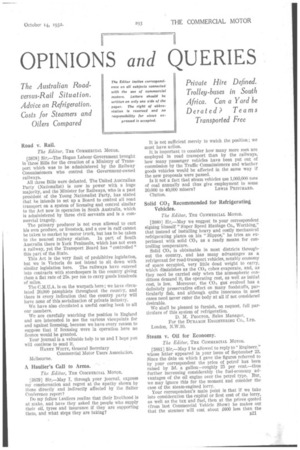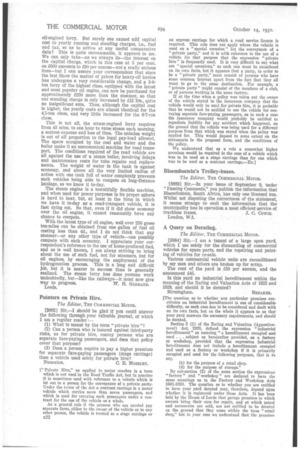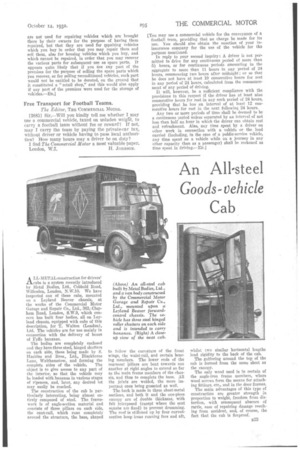OPINIONS and QUERIES
Page 47

Page 48

Page 49

If you've noticed an error in this article please click here to report it so we can fix it.
The Australian Roadversus-Rail Situation. Advice on Refrigeration. Costs for Steamers and Oilers Compared Private Hire Defined. Trolley-buses in South Africa. Can a Yard be Derated? Teams Transported Free
Road v. Rail.
The Editor, THE COMMERCIAL MOTOR.
[3878] Sir,—The Hogan Labour Government brought in three Bills for the creation of a Ministry of TransPort which was to be administered by the Railway Commissioners who control the Government-owned railways, All three Bills were defeated. The United Australian Party (Nationalist) is now in power with a huge majority, and the Minister for Railways, who is a past president of the Young Nationalist Party, has stated that be intends to set up a Board to control all road transport on a system of licensing and control similar to the Act now in operation in South Australia, which is administered by three civil servants and is a commercial tragedy.
The primary producer is not even allowed to cart his own produce, or livestock, and a cow in calf cannot be taken to market by motor truck, but has to be taken to the nearest railway station. In part of South Australia there is York Peninsula, which has not even a railway, yet the Transport Board has " controlled " this part of the State.
This Act is the very limit of prohibitive legislation, but we in Victoria do not intend to sit down with similar legislation here. The railways have entered into contracts with storekeepers in the country giving them a flat rate of 25s. per ton to carry goods hundreds of miles.
The C.M.U.A. is on the warpath here; we have circulated 20,000 pamphlets throughout the country, and there is every indication that the country party will have none of this socialization of private industry. We have also circulated a useful costing book to all our members.
We are carefully watching the position in England and are interested to see the various viewpoints for and against licensing, because we have every reason to suppose that if licensing were in operation here no licence would be granted.
Your journal is a valuable help to us and I hope you will continue to send it.
HARRY WITTY, General Secretary Commercial Motor Users Association. Melbourne.
A Haulier's Call to Arms.
The Editor, THE COMMERCIAL MOTOR.
[3879] Sir,—May I, through your journal, express my consternation and regret at the apathy shown by those directly and indirectly affected by the Salter Conference report?
Do my fellow Lauliers realize that their livelihood is at stake, and have they asked the people who supply their oil, tyres and insurance if they are supporting them, and what steps they are taking? It is not sufficient merely to watch the position ; we must have action.
It is important to consider how many more men are employed in road transport than by the railways, how many passenger vehicles have been put out of commission by the Traffic Commissioners and whether goods vehicles would be affected in the same way if the new proposals were passed. Is it not a fact that steam vehicles use 1,000,000 tons of coal annually and thus give employment to some 3(1,000 to 40,000 miners? LEWIS PRITCHARD. Glutton.
Solid COI Recommended for Refrigerating Vehicles.
The Editor, THE COMMERCIAL MOTOR.
[3880] Sir,—May we suggest to your correspondent signing himself "Super Speed Haulage Co., Worthing," that instead of installing heavy and costly mechanical refrigerating plants on his "Hippos," he tries an experiment with solid 002 as a ready means for controlling temperature.
Solid CO, is obtainable in most districts throughout the country, and has many advantages as a refrigerant for road-transport vehicles, notably economy of space occupied, very little dead weight to carry, which diminishes as the CO, cubes evaporate, and, as they need be carried only when the atmospheric conditions demand it, the operating cost, as well as initial cost, is low. Moreover, the CO2 gas evolved has a definitely preservative effect on many foodstuffs, particularly fish, and although quite innocuous in most eases need never enter the body at all if not considered desirable.
We shall be pleased to furnish, on request, full particulars of this system of refrigeration. D. M. PROCTOR, Sales Manager, For the EIIRAMIN ENGINEERING CO., LTD. London, N.W.10.
Steam v. Oil for Economy.
The Editor, THE COMMERCIAL MOTOR.
[3881] Sir,—May I be allowed to reply to" Engineer," whose letter appeared in your issue of September 23. Since the date on which I gave the figures referred to by your correspondent the price of petrol' has been raised by 3(1, a gallon—roughly 25 per cent—thus further increasing considerably the fuel-economy advantages of the oil engine over the petrol type. But, we may ignore this for the moment and consider the case of the steam-engined lorry. Your correspondent's main point is that if we take into consideration the capital or first cost of the lorry, as well as the tax and fuel, then at the prices quoted (from last Commercial Vehicle Show) he makes out that the steamer will cost about £600 less than the oil-engined lorry. But surely one cannot add capital cost to yearly running and standing charges, i.e., fuel and tax, so as to arrive at any useful comparative data? This is quite unreasonable, it appears to me. We can only take—as we always do—the interest on the capital charge, which in this case at 5 per cent. on £600 amounts to £30 per annum—not a really serious Item—but I can assure your correspondent that since the last Show the matter of prices for heavy-oil lorries has undergone a very considerable change, and a 5-6ton lorry of the highest class, equipped with the latest and most popular oil engine, can now be purchased for approximately £250 more than the steamer, so that our standing charge is only increased by £12 10s., quite an insignificant sum. Thus, although the capital cost is higher, the yearly costs are almost identical for the 4.5-ton class, and very little increased for the 6-7-ton class.
This is not all, the steam-engined lorry requires from 45 mins. to one hour to raise steam each morning, a serious expense and loss of time. The unladen weight is out of all proportion to the legal pay-load allowed. The space occupied by the coal and water and the boiler make it an uneconomical machine for road transport. The conditions required of the road vehicle are all against the use of a steam boiler, involving delays and maintenance costs for tube repairs and replacements. The weight of water in the tank Is against economy, and above all the very limited radius of action with one tank full of water completely prevents such vehicles being able to compete on long-distance haulage, as we know it to-day.
The steam engine is a beautifully flexible machine, and when used for power purposes in its proper sphere is hard to beat, but, at least in the form in which we have it to-day as a road-transport vehicle, it is fast dying out. So that, even if it did show economy over the oil engine, it cannot reasonably have any chance to compete.
With the latest type of oil engine, well over 250 gross ton-miles can be obtained from one gallon of fuel oil costing less than 4d., and I do not think that any steamer—or any other type of vehicle—can possibly compete with such economy. I appreciate your correspondent's reference to the use of home-produced fuel, and as is well known, I am alway striving to bring about the use of such fuel, not for steamers, but for oil engines, by encouraging the employment of the hydrogenation process. This is a long and difficult Job, but it is nearer to success than is generally realized. The steam lorry has done yeoman work undoubtedly, but—like the railways—it must now give way to progress. W. H. GODDARD. Leeds.
Pointers on Private Hire.
The Editor, THE COMMERCIAL MOTOR.
[3882] Sir,-1 should be glad if you could answer the following through your valuable journal, of which I am a regular reader :— (1) What is meant by the term "private hire "?
(2) Can a person who is insured against third-party risks, as for private hire, convey persons who are separate fare-paying passengers, and does that policy cover that purpose?
(3) Does a person require to pay a higher premium for separate fare-paying passengers (stage carriage) than a vehicle used solely for private hire?
Nuneaton. C. E. MOSELEY.
["Private Hire," as applied to motor coaches is a term which is not used in the Road Traffic Act, but in practice it is sometimes used with reference to a vehicle which is let out to a person for the conveyance of a private party. Under the terms of the Act a contract carriage is a motor vehicle which carries more than seven passengers, and which is used for carrying such passengers under a contract for the use of the vehicle as a whole.
As a general rule if the persons who are carried pay separate fares, either to the owner of the vehicle or to any other person, the vehicle is treated as a stage carriage or B22
an express carriage for which a road service licence is required. This rule does not apply where the vehicle is used on a "special occasion" for the conveyance of a "private party," and it is with reference to the use of a vehicle for that purpose that the expression "private hire" is frequently used. It is very difficult to say what are "special occasions," as each one must be considered on its own facts, but it appears that a party, in order to be a "private party," must consist of persons who have some common interest apart from the fact that they all want to go to the same destination. For example, a "private party" might consist of the members of a club, or of persons working in the same factory.
If at the time when a policy was taken out the owner of the vehicle stated to the insurance company that the vehicle would only be used for private hire, it is probable that he would not be entitled to use the vehicle for conveying separate fare-paying passengers, as in such a case the insurance company would probibly be entitled to repudiate liability for any accident which happened, on the ground that the vehicle was being used for a different purpose from that which was stated when the policy was applied for. This would depend to some extent on the statements in the proposal form, and the conditions of the policy.
We understand that as a rule a somewhat higher premium would be required in the case of a vehicle which was to be used as a stage carriage than for one which was to be used as a contract carriage.—En.]
Bloemfontein's Trolley-buses.
The Editor, THE COMMEROIAL MOTOR.
[3883] Sir,—In your issue of September 9, Under "Passing Comments," you publish the information that Bloemfontein, South Africa, has only one licensed bus. Whilst not disputing the correctness of the statement, it seems strange to omit the information that the municipality has in operation a most efficient service of trackless trams. C. COWIE. London, W.1.
A Query on Berating.
The Editor, THE COMMERCIAL MOTOR.
[3884] Sir,—I am a tenant of a large open yard, which I use solely for the dismantling of commercial vehicles for spare parts, and the repairing and painting of vehicles for re-sale.
Various commercial vehicle units are reconditioned by my men and others are broken up for scrap. The rent of the yard is £50 per annum, and the assessment £45.
Is this yard an industrial hereditament within the meaning of the Rating and Valuation Acts of 1925 and 1929, and should it be derated?
Birmingham. BREAKER.
[The question as to whether any particular premises constitutes an industrial hereditament is one of considerable difficulty, as each case has to be considered and dealt with on its own facts, but on the whole it appears to us that your yard answers the necessary requirements, and should be aerated.
Section 3 (1) of the Rating and Valuation (Apportionment) Act, 1928, defined the expression "industrial hereditament" as meaning "a hereditament occupied and used . . . subject as hereinafter provided, as a factory or workshop, provided that the expression industrial hereditament does not include a hereditament occupied and used as a factory or workshop if it is primarily occupied and used for the following purposes, that is to say,
(b) for the purpose of a retail shop.
(d) for the purpose of storage."
By sub-section (2) of the same section the expressions " factory " and " workshop " are declared to have the same meanings as in the Factory and Workshop Acts 1901-1020. The question as to whether you are entitled to have your yard derated may, therefore, depend upon whether it is registered under those Acts. It has been held by the House of Lords that garage premises to which owners bring their cars for repair, and at which petrol and accessories are sold, are not entitled to be derated on the ground that they come within the term "retail shop," but in your case we understand that the premises are not used for repairing vehicles which are brought there by their owners for the purpose of having them repaired, but that they are used for cepairing vehicles which you buy in order that you may repair them and sell them, also for housing vehicles which you buy, and which cannot be repaired, in order that you may recover the various parts for subsequent use as spare parts. It appears quite likely that if you use any part of the premises for the purpose of selling the spare parts which you recover, or for selling reconditioned vehicles, such part would not be entitled to be derated, on the ground that it constituted a "retail shop," and this would also apply if any part of the premises were used for the storage of vehicles.—En.]
Free Transport for Football Teams.
The Editor, THE COMMERCIAL MOTOR.
[38851 Sir,—Will you kindly tell me whether I may use a commercial vehicle, taxed on unladen weigift, to carry a football team without fee or reward? If not, may I carry the team by paying the private-car tax, without driver or vehicle having to pass local authorities? How many hours may a driver be on duty?
I find The Commercial Motor a most valuable paper.
London, W.7. H. JOHNSON. [You may use a commercial vehicle for the conveyance of a football team, providing that no charge be made for its use. You should also obtain the sanction of your ininsurance company for the use of the vehicle for the purpose mentioned. In reply to your second inquiry : A driver is not per
mated to drive for any continuous period of more than 5i hours, or for continuous periods amounting in the aggregate to more than 11 hours in any period of 24 hours, commencing two hours after midnight; or so that he does not have at least 10 consecutive hours for rest in any period of 24 hours, calculated from the commencement of any period of driving.
It will, however, be a sufficient compliance with the provisions in this respect if the driver has at least nine consecutive hours for rest in any such period of 24 hours, providing that he has an interval of at least 12 consecutive hours for rest in the next following 24 hours.
Any two or more periods of time shall be deemed to be a continuous period unless separated by an interval of not less than half an hour in which the driver can obtain rest and refreshment. Also, any time spent by a driver on other work in connection with a vehicle or the load carried (including, in the case of a public-service vehicle, any time spent on a vehicle while on a journey in any other capacity than as a passenger) shall be reckoned as time spent in driving.—En.]




































































































